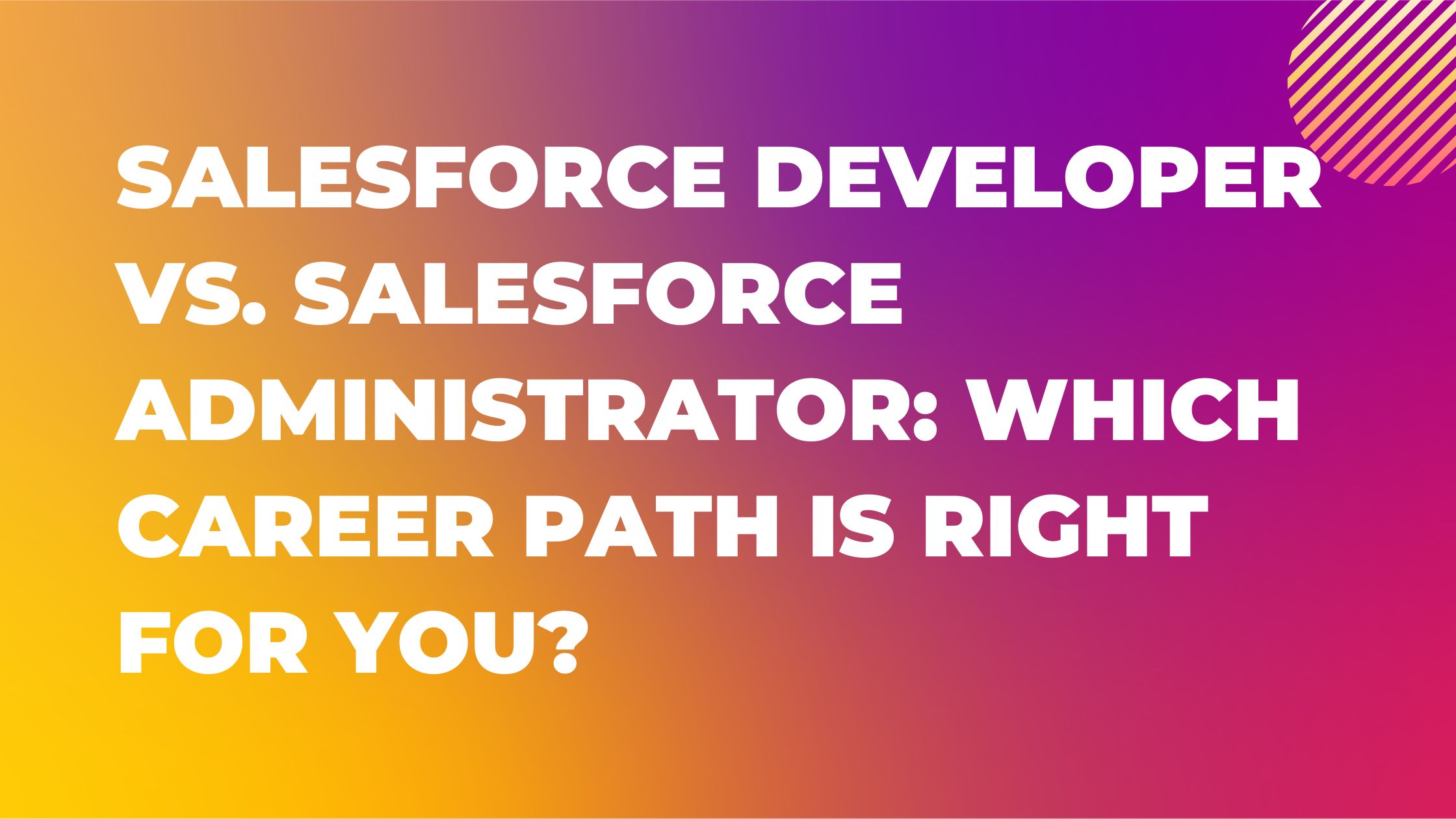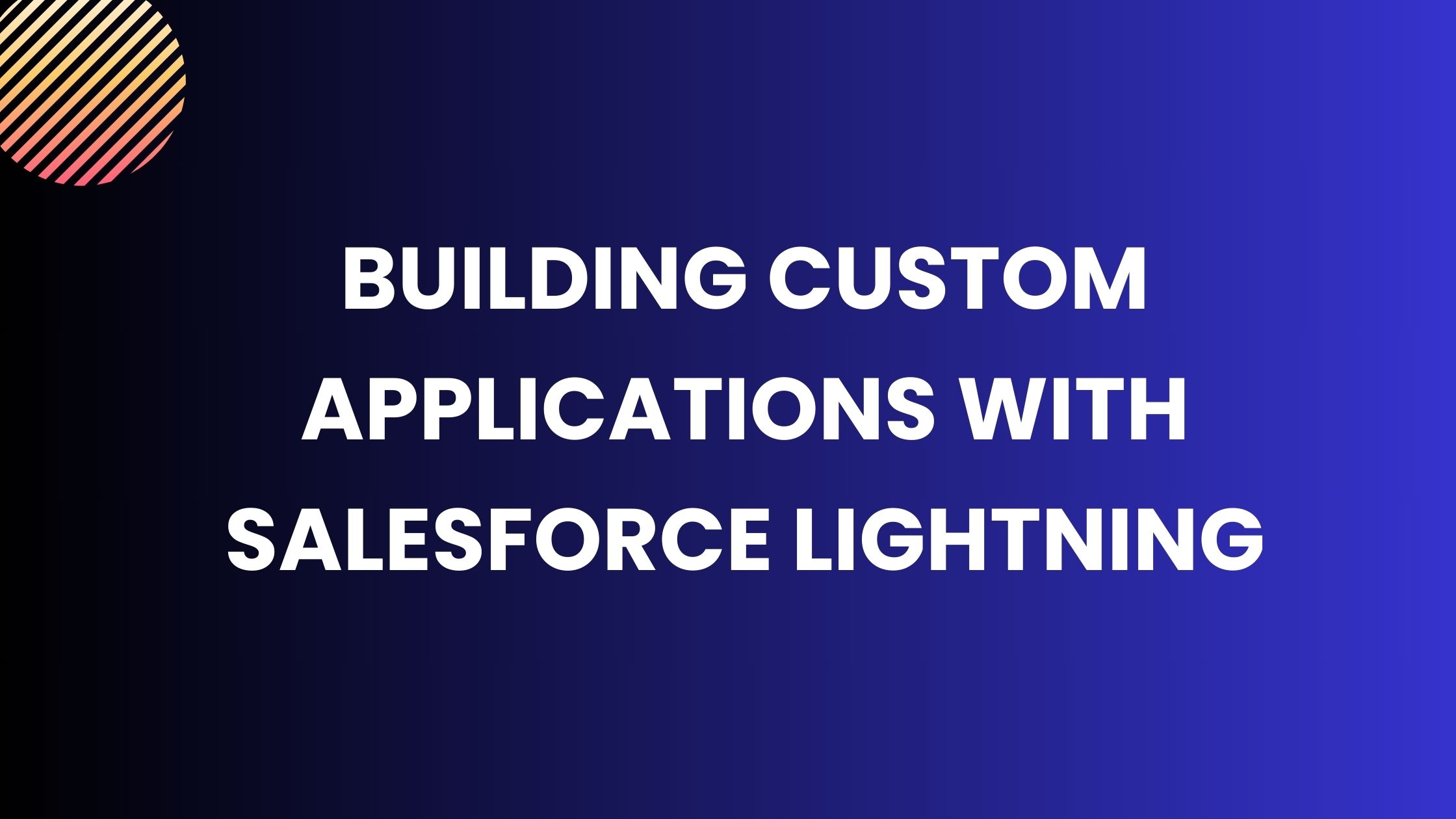Salesforce Developer vs. Salesforce Administrator
Salesforce Developer vs. Salesforce Administrator: Which Career Path is Right for You?
In today’s rapidly evolving tech landscape, Salesforce careers have gained significant traction. Whether you’re a seasoned professional or just starting your journey in the tech world, choosing the right career path can be daunting. Two prominent roles in the Salesforce ecosystem are the Salesforce Developer and the Salesforce Administrator. Each role has its unique set of responsibilities, required skills, and career trajectories. This article aims to provide a comprehensive comparison of these two career paths to help you decide which one is right for you.
What is a Salesforce Developer?
Role and Responsibilities
A Salesforce Developer is primarily responsible for designing, coding, and implementing solutions within the Salesforce platform. They use Apex (Salesforce’s proprietary programming language) and Visualforce to create custom applications that meet the specific needs of an organization. Their tasks include developing new functionalities, integrating Salesforce with other systems, and maintaining existing applications.
Required Skills and Qualifications
To become a successful Salesforce Developer, you need a strong background in software development. Proficiency in programming languages such as Java, JavaScript, and Apex is essential. Familiarity with web development technologies like HTML, CSS, and Lightning components is also beneficial. Most employers prefer candidates with a Bachelor’s degree in Computer Science or a related field, along with relevant certifications.
Typical Day in the Life of a Salesforce Developer
A typical day for a Salesforce Developer involves coding, debugging, and collaborating with other team members. They often participate in meetings to understand project requirements and provide technical insights. The role demands a high level of problem-solving skills and the ability to work under tight deadlines.
What is a Salesforce Administrator?
Role and Responsibilities
A Salesforce Administrator manages and configures the Salesforce platform to ensure it operates efficiently and effectively. They are responsible for user management, security settings, data management, and system maintenance. Administrators also create reports and dashboards, automate processes using tools like Process Builder, and provide user support and training.
Required Skills and Qualifications
Salesforce Administrators need strong analytical skills and a good understanding of business processes. While a technical background is beneficial, it’s not as critical as for developers. Key skills include data management, problem-solving, and communication. Certification in Salesforce administration is highly recommended.
Typical Day in the Life of a Salesforce Administrator
A typical day for a Salesforce Administrator includes managing user accounts, troubleshooting issues, customizing the platform to meet business needs, and generating reports. They frequently interact with various departments to ensure the system supports business operations effectively.
Educational Pathways and Certifications
Salesforce Developer Certifications
To enhance your career as a Salesforce Developer, certifications such as Salesforce Certified Platform Developer I and II are crucial. These certifications validate your ability to build custom applications and understand the intricacies of the Salesforce platform.
Salesforce Administrator Certifications
For aspiring Salesforce Administrators, certifications like Salesforce Certified Administrator and Advanced Administrator are essential. These certifications demonstrate your ability to configure and manage Salesforce to meet business requirements.
Importance of Salesforce Classes in Pune
Attending Salesforce classes in Pune can be a game-changer for both developers and administrators. These classes provide hands-on experience, expert guidance, and networking opportunities with professionals in the field. Whether you’re looking to gain foundational knowledge or advanced skills, enrolling in Salesforce classes in Pune can accelerate your career growth.
Salary and Career Growth
Salary Comparison
Both Salesforce Developers and Administrators enjoy lucrative salaries, but developers typically earn more due to the technical nature of their work. According to recent data, the average salary for a Salesforce Developer in the US is around $120,000 per year, while a Salesforce Administrator earns approximately $90,000 per year.
Career Advancement Opportunities
Career advancement opportunities are abundant for both roles. Developers can move into senior development positions, solution architecture, or technical leadership roles. Administrators can advance to senior administration positions, become Salesforce Consultants, or transition into business analysis.
Job Market Demand
The demand for Salesforce professionals is high and continues to grow. With more companies adopting Salesforce, the need for skilled developers and administrators remains robust. Both roles offer job security and numerous opportunities for career advancement.
Skills Comparison
Technical Skills for Developers
Salesforce Developers need strong programming skills, knowledge of Apex and Visualforce, and experience with web development technologies. They must also be adept at database management and understand the Salesforce platform’s technical architecture.
Technical Skills for Administrators
Salesforce Administrators should be proficient in data management, system configuration, and automation tools like Process Builder and Flow. They need a good understanding of business processes and the ability to translate business requirements into technical solutions.
Soft Skills Needed for Both Roles
Both roles require excellent problem-solving skills, attention to detail, and strong communication abilities. Developers and administrators must work well in team environments and manage their time effectively.
Work Environment
Work Settings for Developers
Salesforce Developers often work in tech-centric environments, collaborating with other developers, engineers, and IT professionals. They may work for software companies, tech startups, or large corporations with in-house development teams.
Work Settings for Administrators
Salesforce Administrators work across various industries, including finance, healthcare, and retail. They typically interact with end-users, management, and IT staff to ensure the Salesforce platform meets organizational needs.
Remote Work and Flexibility
Both roles offer opportunities for remote work and flexible schedules. Many companies provide remote work options, allowing professionals to balance work and personal life effectively.
Industry Demand
Industries Hiring Salesforce Developers
Industries such as technology, finance, and healthcare are major employers of Salesforce Developers. These industries require custom applications and integrations to streamline operations and improve customer experiences.
Industries Hiring Salesforce Administrators
Salesforce Administrators are in demand across all sectors, including retail, education, and non-profits. Any organization using Salesforce needs skilled administrators to manage and optimize their systems.
Geographic Hotspots
Geographic hotspots for Salesforce careers include major tech hubs like San Francisco, New York, and London. However, with the rise of remote work, opportunities are becoming more geographically dispersed.
Case Studies
Success Story of a Salesforce Developer
Jane Doe transitioned from a traditional software developer role to a Salesforce Developer. After completing Salesforce certifications and attending Salesforce classes in Pune, she landed a job at a leading tech company. Today, she leads a team of developers and has significantly contributed to her organization’s digital transformation.
Success Story of a Salesforce Administrator
John Smith started as a data analyst before moving into Salesforce administration. With certifications and hands-on experience, he now works as a Senior Salesforce Administrator at a multinational corporation. His role has evolved to include strategic planning and system optimization.
Lessons Learned
Both Jane and John highlight the importance of continuous learning and staying updated with the latest Salesforce developments. They recommend networking and seeking mentorship to navigate career challenges effectively.
Pros and Cons
Pros of Being a Salesforce Developer
- High earning potential
- Technical and challenging work
- Opportunities for innovation
Cons of Being a Salesforce Developer
- Requires strong programming skills
- Continuous need for technical upskilling
- High-pressure deadlines
Pros of Being a Salesforce Administrator
- Diverse job opportunities
- Crucial role in business operations
- Less technical but impactful work
Cons of Being a Salesforce Administrator
- May involve repetitive tasks
- Requires strong problem-solving skills
- Need for continuous learning
Career Transitioning
Moving from Administrator to Developer
Transitioning from a Salesforce Administrator to a Developer requires acquiring technical skills and certifications in development. This path can open new career opportunities and increase earning potential.
Moving from Developer to Administrator
Developers moving to administration roles can leverage their technical expertise to optimize systems. This transition may involve learning more about business processes and user management.
Benefits of Cross-Skilling
Cross-skilling between development and administration can make professionals more versatile and valuable to employers. It enhances problem-solving capabilities and opens doors to hybrid roles.
Job Satisfaction
Job Satisfaction Rates
Both roles report high job satisfaction due to the impactful nature of their work and opportunities for career growth. However, satisfaction can vary based on individual preferences and workplace environment.
Factors Influencing Job Satisfaction
Key factors influencing job satisfaction include work-life balance, opportunities for advancement, and the ability to make a meaningful impact. Personal interests and career goals also play a significant role.
Personal Fulfillment in Each Role
Personal fulfillment in each role depends on individual interests and strengths. Developers may find fulfillment in creating innovative solutions, while administrators may enjoy optimizing systems and supporting users.
Future Trends
Emerging Trends in Salesforce Development
Emerging trends in Salesforce Development include the rise of AI and machine learning integrations, the increasing importance of mobile development, and the growing demand for custom applications.
Emerging Trends in Salesforce Administration
Salesforce Administration trends include the increased use of automation tools, the integration of advanced analytics, and the growing emphasis on user experience and system optimization.
How to Stay Updated
Staying updated involves continuous learning through online courses, attending Salesforce events, participating in forums, and following industry news. Certifications and advanced training can also help professionals stay current.
Community and Resources
Salesforce Community Support
The Salesforce community offers extensive support through forums, user groups, and online resources. Engaging with the community can provide valuable insights, networking opportunities, and professional development.
Online Resources and Forums
Online resources such as Trailhead, Salesforce’s official learning platform, offer free courses and tutorials. Forums like Salesforce Stack Exchange and various LinkedIn groups provide a platform for discussion and knowledge sharing.
Importance of Networking
Networking is crucial for career growth. Attending events, joining professional groups, and connecting with peers can lead to new opportunities, mentorship, and collaboration.
Conclusion
Choosing between a career as a Salesforce Developer and a Salesforce Administrator depends on your interests, skills, and career goals. Both roles offer exciting opportunities, competitive salaries, and the chance to make a significant impact within an organization. Whether you enjoy coding and creating custom solutions or optimizing systems and supporting users, there is a path for you in the Salesforce ecosystem. Take advantage of resources like Salesforce classes in Pune to gain the skills you need and start your journey towards a fulfilling Salesforce career.
FAQs
- What is the main difference between a Salesforce Developer and an Administrator?
- The main difference lies in their responsibilities. Developers focus on coding and creating custom solutions, while administrators manage and configure the Salesforce platform to meet business needs.
- Can I switch between being a Salesforce Developer and an Administrator?
- Yes, with the right skills and certifications, transitioning between these roles is possible. Cross-skilling can enhance your versatility and open new career opportunities.
- How long does it take to become a certified Salesforce Developer or Administrator?
- The time required varies based on prior experience and the time dedicated to studying. On average, it can take a few months to a year to prepare for and obtain certifications.
- Are there opportunities for remote work in these roles?
- Yes, both roles offer remote work opportunities. Many companies provide flexible work arrangements for Salesforce professionals.
- What are the best Salesforce classes in Pune?
- Pune offers several reputable training institutes for Salesforce classes. These classes provide hands-on experience, expert guidance, and can significantly enhance your skills and career prospects.



